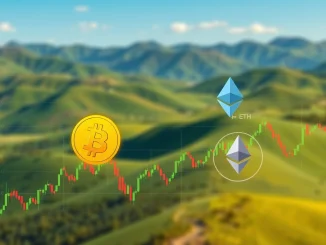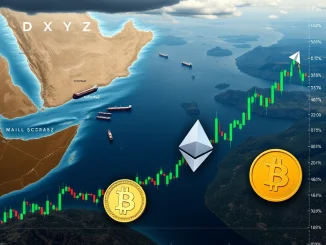
Ever wondered how global political events, even those seemingly unrelated to digital assets, can ripple through the cryptocurrency world? It turns out, they often do. A recent report highlighted comments from U.S. President Donald Trump regarding the potential impact of **Iran military action** on financial markets. While the initial context focuses on traditional markets, understanding these dynamics is key for anyone navigating the volatile crypto landscape.
Trump’s Take on **Trump Iran Markets**
According to a report citing President Trump’s conversation with the Wall Street Journal, he expressed a view that a potential military strike against Iran could actually be beneficial for markets. The rationale presented was that such action would prevent Iran from obtaining a nuclear weapon, thereby removing a significant long-term risk factor perceived by some market participants.
This perspective is notable because it links a major geopolitical decision directly to expected market outcomes. Traditionally, military conflict or heightened tensions are often seen as sources of uncertainty, which can lead to market downturns or increased volatility. However, Trump’s comment suggests a different interpretation in this specific context, framing the action as a resolution of a larger, underlying risk (nuclear proliferation) that markets might ultimately view positively.
Understanding the **Market Reaction Iran** Scenario
When significant geopolitical events occur, traditional financial markets typically react based on several factors:
- **Uncertainty:** Initial reactions are often negative as markets dislike unpredictability.
- **Risk Assessment:** Investors evaluate the potential economic impact, supply chain disruptions (especially related to oil), and the likelihood of wider conflict.
- **Safe Havens:** Capital often flows into assets perceived as safe, such as gold, certain government bonds (like US Treasuries), and sometimes, the US dollar.
- **Sectoral Impact:** Specific sectors like defense or energy may see different reactions compared to the broader market.
President Trump’s comments introduce a layer of complexity, suggesting that for this specific scenario, the *prevention* of a perceived greater risk (nuclear Iran) might outweigh the immediate uncertainty of military action in the eyes of the market. This is a subject of debate among economists and political analysts.
The Link: **Geopolitical Risk Crypto**
Now, how does this connect to your crypto portfolio? The relationship between geopolitical events and cryptocurrency prices is not always direct or predictable, but several potential links exist:
- **Overall Market Sentiment:** Crypto markets, while distinct, are increasingly correlated with traditional finance. If major global events cause significant shifts or volatility in stock markets, crypto often feels the effects, sometimes amplifying the moves.
- **Safe Haven Narrative:** Bitcoin, in particular, is sometimes touted as a digital safe haven asset, similar to gold. In times of heightened geopolitical tension or economic uncertainty, some investors might turn to Bitcoin as an alternative store of value, potentially driving demand and price.
- **Currency Debasement Fears:** Geopolitical instability can sometimes lead to concerns about the stability of fiat currencies in affected regions or globally, potentially increasing interest in decentralized alternatives like cryptocurrencies.
- **Increased Volatility:** At the very least, major global events inject uncertainty into the entire financial ecosystem, leading to increased volatility across asset classes, including crypto.
While President Trump’s specific comment about Iran military action being positive for markets is a particular viewpoint, the underlying theme of geopolitical risk and its potential market consequences is highly relevant to crypto investors. Understanding how traditional markets might react provides context for potential ripple effects in the digital asset space.
Considering the **Crypto Geopolitical Impact**
The idea of a significant geopolitical event having a notable **crypto geopolitical impact** is gaining traction as the digital asset market matures and becomes more integrated into the global financial system. While Bitcoin’s price doesn’t always move in lockstep with every political headline, prolonged periods of international tension, conflict, or economic instability can influence investor behavior and capital flows that eventually reach crypto markets.
For instance, during times of significant global crisis, we’ve seen arguments made for Bitcoin as a non-sovereign, censorship-resistant asset. This narrative suggests it could serve as a hedge against risks specific to traditional financial systems tied to nation-states. Whether this narrative consistently holds true during all types of geopolitical stress is a subject of ongoing observation and debate.
What Does This Mean for Investors?
President Trump’s comments on **Trump Iran markets** and the broader context of potential **Iran military action** serve as a reminder that global events matter. For cryptocurrency investors, this means:
- **Stay Informed:** Pay attention not just to crypto-specific news, but also to major global political and economic developments.
- **Understand Correlation:** Recognize that crypto markets are not entirely isolated from traditional finance and global events.
- **Assess Risk:** Consider how geopolitical risk fits into your overall investment strategy. Are you comfortable with potential volatility stemming from such events?
- **Diversification:** Geopolitical risk is one reason investors consider diversifying their portfolios across different asset classes.
While predicting the exact impact of any single event is impossible, understanding the potential pathways through which geopolitical risk can influence markets, including crypto, is a valuable part of informed investing.
Summary: Navigating Geopolitical Winds in Crypto
President Trump’s assertion that potential military action against Iran could benefit markets by preventing nuclear capabilities highlights how leaders can frame geopolitical decisions in economic terms. While traditional markets react to such news based on complex factors like uncertainty and perceived risk resolution, the cryptocurrency market is also exposed to these global dynamics. The concept of **geopolitical risk crypto** is real, influencing overall market sentiment, potentially driving interest in assets like Bitcoin as perceived safe havens, and certainly contributing to the inherent volatility of the digital asset space. Staying aware of global events and their potential ripple effects is crucial for navigating the interconnected world of finance, including the ever-evolving crypto market.



